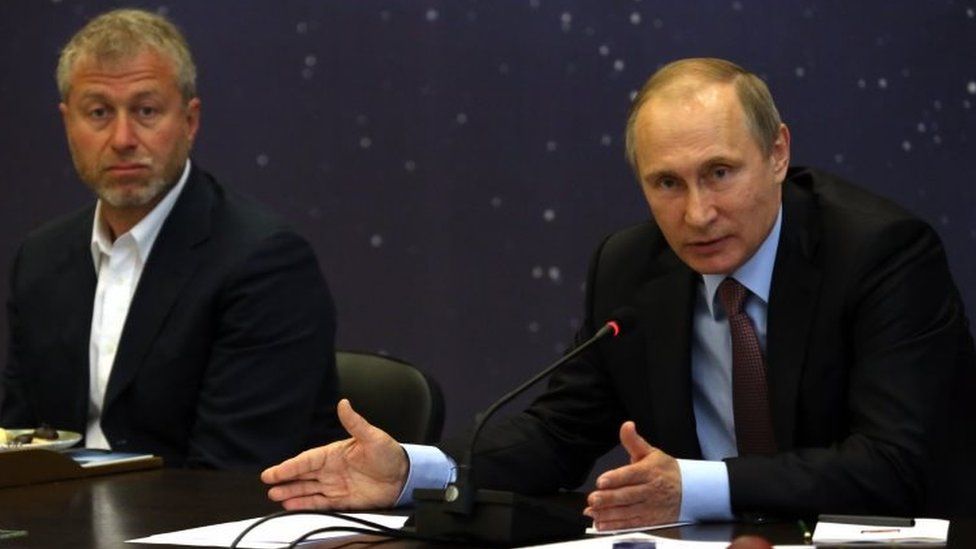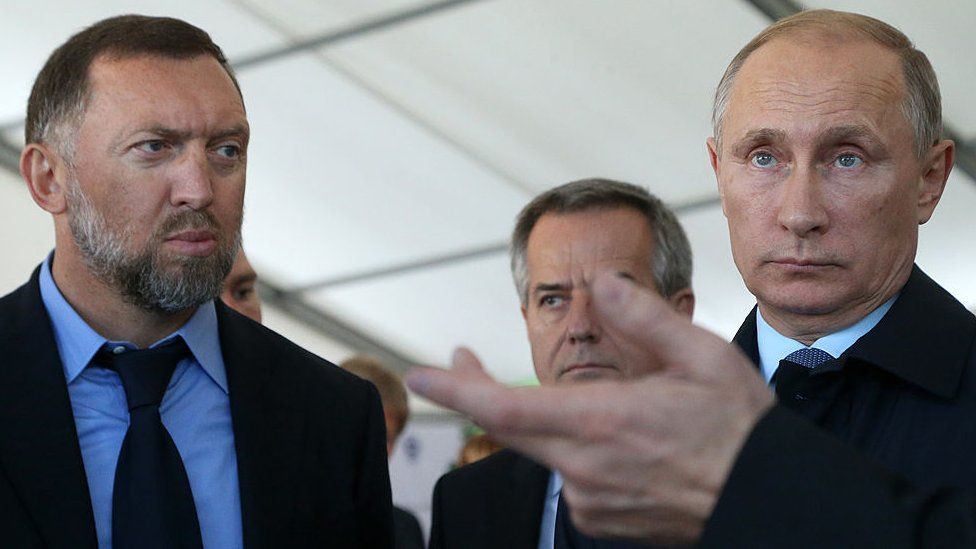Chelsea FC owner Roman Abramovich has been sanctioned by the UK government as part of its response to Russia’s invasion of Ukraine.
He is one of seven oligarchs to be hit with fresh sanctions, including asset freezes and travel bans.
The list also includes billionaires Igor Sechin and Oleg Deripaska, both seen as allies of Vladimir Putin.
Prime Minister Boris Johnson said “there can be no safe havens” for those who have supported the invasion.
Chelsea FC cannot sell any more tickets for games, its merchandise shop will be closed, and it will be unable to buy or sell players on the transfer market.
The government said it would issue a special licence that allows fixtures to be fulfilled, staff to be paid and existing ticket holders to attend matches.
Ministers have come under pressure to sanction Mr Abramovich, who said he had made the “difficult decision” to sell Chelsea FC earlier this month.
The football club is among the assets frozen as part of the sanctions against Mr Abramovich and its sale has now been stalled.

But the BBC understands the government would consider allowing Mr Abramovich to apply for a special licence to sell the club, providing he can prove he would not benefit from the sale.
Mr Abramovich, 55, is alleged to have strong ties to Russian President Vladimir Putin, which he has denied.
The government says Mr Abramovich, who has an estimated net worth of £9.4bn, is “one of the few oligarchs from the 1990s to maintain prominence under Putin”.
Mr Abramovich has stakes in steel giant Evraz and Norilsk Nickel. He sold a 73% stake in Russian oil firm Sibneft to state-owned gas titan Gazprom for £9.87bn in 2005.
He is believed to own a number of properties in the UK, including a 15-bedroom mansion at Kensington Palace Gardens in west London, reportedly valued at more than £150m.
Chelsea reassurances
While the sanctions against him throw Chelsea’s future in doubt, ministers sought to reassure the club it would not be “unnecessarily harmed”.
In a tweet, Culture Secretary Nadine Dorries said holding those who have “enabled the Putin regime to account” was the priority.
“I know this brings some uncertainty, but the government will work with the league and clubs to keep football being played while ensuring sanctions hit those intended,” she wrote.
When asked if being unable to sell tickets and merchandise would hit Chelsea’s finances, the culture secretary said: “Sanctions have consequences and that’s a fact.”
London Mayor Sadiq Khan expressed support for the government’s actions but said Chelsea fans were “completely innocent” and that it was important to ensure the club was not “sold off in a fire sale
Telecommunications company Three, said it would temporarily suspend its sponsorship of the club and would “request the removal of our brand from shirts and around the stadium until further notice”.
Chelsea has enjoyed major success since Mr Abramovich bought the club in 2003 for £140m, winning major titles including the Champions League, the Premier League and the FA Cup.
The club’s fans were heard chanting Mr Abramovich’s name during a match against Norwich on Thursday evening.
Mr Abramovich has previously said that proceeds of the club’s sale would be donated to victims of war.
On Wednesday, there were 20 credible interested parties looking at a potential Chelsea takeover, including British businessman Nick Candy.

Analysis from BBC home affairs correspondent Daniel Sandford
Like all the Russian billionaires who still run businesses in their motherland, Roman Abramovich has had to remain on good terms with President Putin, even though he no longer spends much time in the country.
This is what led to him being sanctioned, with the UK government saying he is a “pro-Kremlin oligarch” who had has a “close relationship” with Vladimir Putin for decades and has obtained “financial benefit” and “preferential treatment” from that relationship.
One example given of that is the contracts he received in the run up to the FIFA 2018 World Cup.
More specifically on Ukraine and the Russian army, the UK government claims one of Mr Abramovich’s companies, Evraz Plc, may “potentially” have been involved in providing steel which “may have been used in the production of tanks”.
It is probably now too late for Roman Abramovich to recover his position and he may find himself being sanctioned by the US and the EU as well.
Like many Russian businessmen he is now likely to turn to China.

The UK and its western allies have been ratcheting up sanctions against individuals and companies linked to President Putin since the invasion of Ukraine was launched on 24 February.
The government said Thursday’s sanctions against “seven of Russia’s wealthiest and most influential oligarchs” were part of the UK’s “efforts to isolate Putin and those around him”.
Among those sanctioned was Oleg Deripaska, a leading industrialist who has had links with British politicians.
Once one of the richest men linked to President Putin, Mr Deripaska made billions from his stake in Russia’s aluminium industries, including EN+ Group, and has a multi-million pound property portfolio in the UK.
Media reports have named Mr Deripaska as the owner of a property on Belgrave Square, one of London’s most exclusive neighbourhoods.
His net worth is now an estimated £2bn, according to the Foreign Office, and he has been subject to US sanctions since 2018.
Unlike other Russian oligarchs, who have remained silent on the war in Ukraine so far, Mr Deripaska has called for “peace as soon as possible” in a tweet.

Igor Sechin is another wealthy businessman who is said to have deep ties to President Putin.
Named Putin’s right-hand man by the UK, Mr Sechin worked with the president when he was mayor in St Petersburg in the 1990s.
Igor Sechin is the chief executive of Rosneft, a Russian state oil company, and has been sanctioned by the US and EU.
In its statement, the government said the four others sanctioned included:
- Andrey Kostin, chairman of VTB bank. He “has long supported Kremlin objectives” through the bank, which has already been sanctioned by the UK
- Alexei Miller, CEO of energy company Gazprom. An ally of Mr Putin from his St Petersburg days, he is “one of the most important executives supporting the Russian government”
- Nikolai Tokarev, president of the Russia state-owned pipeline company Transneft, He served with Mr Putin as a KGB officer in Dresden in East Germany in the 1980s and the pair have “remained closely associated ever since”
- Dmitri Lebedev, chairman of the board of directors of Bank Rossiya. Sanctioned by the UK, IS “widely considered to be the Kremlin’s private bank”
The has now sanctioned 18 oligarchs since the invasion of Ukraine began, a Downing Street spokesperson said.
In addition to President Putin, Russian Foreign Minister Sergei Lavrov and four Belarusian generals, 23 high-profile Russian oligarchs were now on the UK’s sanctions list, the spokesperson said.
Foreign Secretary Liz Truss said the government had targeted the oligarchs to “ramp up the pressure on the Putin regime and choke off funds to his brutal war machine”.
She said: “With their close links to Putin they are complicit in his aggression.
“The blood of the Ukrainian people is on their hands. They should hang their heads in shame.”
Labour’s shadow foreign secretary David Lammy said the sanctions were the “right decision” but “should not have taken the government weeks”.
“Too few oligarchs linked to Putin’s rogue regime have so far faced sanctions from the UK government,” Mr Lammy said.
The government has been accused of moving slower than western allies the US and the EU in its sanctioning of individuals linked to President Putin.
The government’s Economic Crime Bill, which is expected to become law later this month, is designed to harden and quicken these sanctions.
The government says the bill will also stop wealthy Russians using the City of London for money laundering and hiding gains linked to organised crime.




